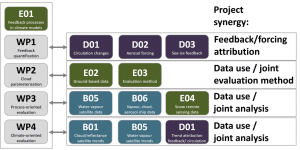PIs: Johannes Quaas, Roel Neggers
Arctic Amplification is driven by changes in the large scale circulation on the one hand, and by local forcing and feedback mechanisms on the other hand. This project investigates quantitatively the physical feedback mechanisms enhancing or dampening climate change following a radiative forcing, and evaluates and improves their representation in general circulation models. These are the Planck, watervapour, lapse rate, surface albedo and cloud feedback mechanisms. We aim at a quantitative characterization of the physical climate feedback processes, their relative importance, their distribution, and their uncertainty, in the Arctic region based on climate simulations with General Circulation Models (GCMs). GCMs are known to have difficulties in realistically simulating relevant processes, especially in the Arctic, and particularly for the representation of clouds. Consequently, the approach is two–fold. On the one hand, the models are used to quantify the feedback given the current state–of–the–art, and to characterize to the extent possible the uncertainty. On the other hand, the models are thoroughly evaluated and the representation of the processes in the models by parameterizations is improved.
For the feedback quantification, we will leverage tools as the partial–radiative–perturbation method we developed in the past to compute the feedback strengths from simulation results of available multi–climate–model ensembles (CMIP5 and, as they become available, CMIP6). The geographical distributionof the feedback strengths in the Arctic is assessed, and the uncertainty is quantified from the inter–model spread and the methodological uncertainty. A particular focus is on the cloud feedback. We will thoroughly assess the cloud parameterizations in the ICON climate model applying different cloud parameterizations, and making use of the ground–based supersite observations. Cloud processes and distributionsin the GCM will be evaluated in a process–oriented manner with active satellite measurements (cloud radar and lidar) as a reference. Statistical relationships will be used to assess the representation of the temperature–, water vapour– and surface albedo feedback mechanisms in the models of the multi–model ensamble, in comparison to observations. In a climate–oriented evaluation, trends and their uncertainty in transient, historical simulations, will be evaluated against observed trends in the Arctic. The results of the process–oriented evaluation will be used to define and perform dedicated simulations with the most reliable model versions. From these simulations we will analyse which means (observations network, length of records) might allow a detection and attribution of the feedback processes with statistical significance.
Hypothesis: We can quantitatively identify the important physical climate feedback mechanisms in the Arctic using state–of–the–art GCMs.
Members
Prof. Dr. Johannes Quaas
Principal Investigator
University of Leipzig
Leipzig Institute for Meteorology (LIM)
Stephanstr. 3
04103 Leipzig
Prof. Dr. Roel Neggers
Principal Investigator
University of Cologne
Institute for Geophysics and Meteorology (IGM)
Pohligstr. 3
50969 Cologne
Dr. Vera Schehmann
Postdoc
University of Cologne
Institute for Geophysics and Meteorology (IGM)
Pohligstr. 3
50969 Cologne
Dr. Jan Chylík
Postdoc
University of Cologne
Institute for Geophysics and Meteorology (IGM)
Pohligstr. 3
50969 Cologne
Karoline Block
PhD
University of Leipzig
Leipzig Institute for Meteorology (LIM)
Stephanstr. 3
04103 Leipzig
-
Prof. Dr. Roel Neggers Principal Investigator
University of Cologne
Institute for Geophysics and Meteorology (IGM)
Pohligstr. 3
50969 Colognephone: ++49 (0) 221 4701614
e-mail: neggers[at]meteo.uni-koeln.de



